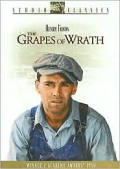
Note: This is #14 in my 52 Classic Movies in 52 Weeks challenge for 2009.
Having grown up in Oklahoma, I’m familiar with the story of The Grapes of Wrath. It’s the law. I’d also read the book by John Steinbeck upon which this movie is based, and was surprised to find out the ways that the movie both differs and stays true to the source material.
Like the book, the movie tells the story of the Joads, a family that sets off to California in search of honest work and a better life after being kicked off their farm in Oklahoma. They make an arduous and occasionally deadly trip across the country in a beat up and overburdened truck, led by wayward son and ex-convict Tom Joad (played by Henry Fonda) and accompanied by a former pastor named Jim Casey. The Joads are beaten down and full of despair over losing their home and livelihood to the big banks that technically own their land, but they are optimistic about what awaits them.
When they get there, however, they just find more business owners who are willing –even eager– to take advantage of them, paying them a pitiful wage for picking fruit that’s not even sufficient to live on, much less prosper. There’s some labor union rabble rousing, some tragedy, and lots more hardships. Interestingly, the tone of the movie takes a sharp detour from the book about 3/4 of the way through, when the Joads encounter a government-sponsored labor community (shades of Socialism here, interestingly) where they have everything from fair wages to toilets to people looking out for each other. Suffice to say that the movie ends in a MUCH more upbeat tone than the book, which basically just shrugged its figurative shoulders and made you feel that the Jodes and everyone like them was hopelessly screwed. Which was probably closer to the truth historically and I thought made for a much more powerful story.
The movie had a lot of other great stuff going for it, though. Henry Fonda was fantastic as Tom Joad, for example. He gave the kind of smooth, believable performance (for which he won an Oscar) that makes you forget that you’re watching an actor and really gets you to buy into the character. John Carradine was also great as ex-pastor turned union organizer Jim Casy, I should also mention. And the cinematography, was fantastic. It strikes me that this is the kind of bleak movie that’s actually better shot in black and white given the way that they made use of such stark lighting and contrasts. To give it color would somehow be untrue to the spirit.
So, I liked the book better for various reasons, but this was a great movie.
Published by